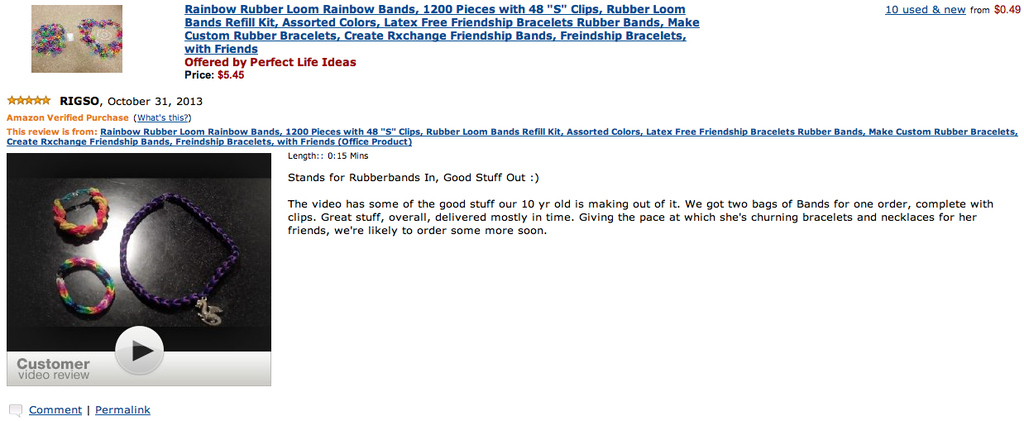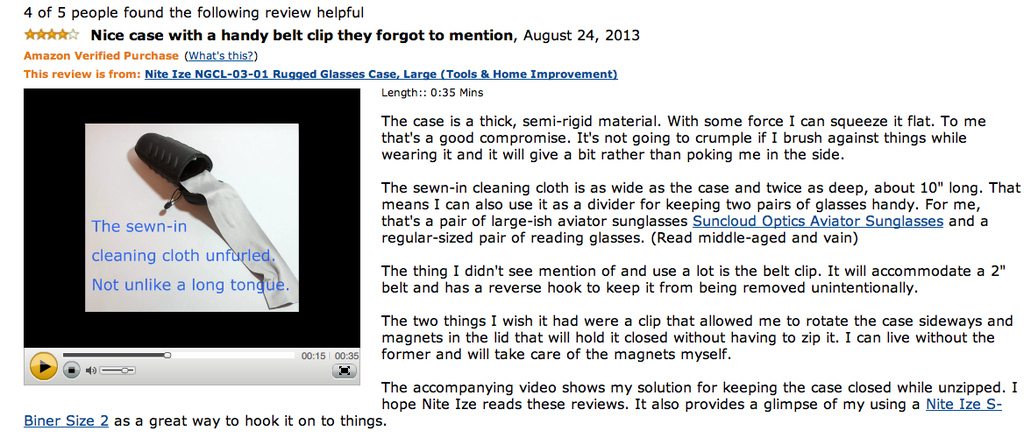
This week NPR published a story about Amazon's Vine Voice invitation-only program, which sends free items, ranging from cookies to digital cameras, to top reviewers in order for them to be reviewed. The implication: People are writing hundreds or thousands of reviews in order to get free stuff. The story also solicited angry comments from Vine reviewers themselves, allowing a rare look into the world of the hardcore Amazon reviewers. The real story, they suggested, wasn't being heard.
BuzzFeed reached out to some of the commenters, as well as people on Amazon's Top Ten Reviewer List (the most up-votes currently) and in the site's Hall of Fame (best over the years).
What we found was a peculiar world of cutthroat competition, gossip, drama, creativity, altruism, egos, and truly well-crafted reviews. For many, writing reviews can be a much-needed escape from real life; a creative outlet amongst a dull corporate world; a way to stick to the man; a place to find a voice, be noticed; and a way to make friends. It's much deeper than free stuff. After all, you have to already be a reviewer with lots of up votes before you can qualify for Vine.
"There are a lot of reasons why people review on Amazon, ranging from the legitimate desire to share their knowledge (or show it off), the need to feed large egos, and even to just get 'free' stuff from Amazon and other vendors," said one Vine reviewer who identified himself only as Mr. Frick, for privacy reasons.

For Frick, it started as a hobby while he was undergoing chemo treatment and needed a distraction. He used to write at least two posts a day, spending as much as three hours on ones that included videos. His thousands of reviews run the gamut from camcorders to low-carb candy, to sci-fi books, to headphones. "I did it because I appreciated others taking time to praise or warn about products, and it was fun to share what I thought of items I spent my hard-earned money on," he told BuzzFeed. "I also enjoyed answering technical questions from other customers and 'meeting' folks with similar interests." He's made online friends with many of the other reviewers as well.
As his cancer treatment has progressed, he's slowed down to batches of reviews once or twice a week. "It still takes a lot of time, but is much more manageable," he says. "I have turned down hundreds of dollars in merchandise over the past few months because it would be hard to give them the attention they deserve."
At its best, reviewing gives people a public voice and a particular sense of importance — something Amazon helps to foster. You get an official ranking, with badges and titles, affirming your expertise as one of the top writers on a website with 250 million unique visitors a month.
"You can provide feedback to manufacturers and vendors that is actually listened to," wrote a user named rugby007 on the NPR website. "There are so many stupid products, with ridiculous features and meaningless, hyperbolic copy, and it's rewarding — and fun — to point this out to the people who make and sell them. Maybe someday down the line we'll get better products."
"It may sound a little grandiose, but it's a desire to help fellow humans make a little sense off the noisy and aggressively strident marketing-embellished reality that's surrounding and is constantly pushing to take control over and redesign and reshape our thoughts, instincts, even reflexes," reviewer Arth Denton told BuzzFeed.
For Denton, a big part of the equation is the "satisfaction of sticking it to 'the man' when I can debunk the hype (think obscenely overpriced Monster cables as a good example)," he said.

Denton doesn't offer any personal details on his site; his location is listed as Minas Anor, one of J. R. R. Tolkien's fictional cities. He's been on the Hall of Fame from 2009 through 2013, and he's written 1,856 reviews since he started in 2000 — which breaks down to about 130 a year. His first began reviewing in 2000 with a one-star review about a "rather dangerous toy," which received over 600 helpful votes and likely helped to protect some kids.
When I asked him if he feels like he's obsessed, he replied, "Are you kidding? I am an extremely well-balanced, super-patient, thoughtful, intelligent, well-read and well-behaved person. I am not losing sleep over reviewing."
Yesterday, he worked a 15-hour workday while also managing to write two fairly lengthy reviews — one of a humidifier, the other a wireless gaming controller. So far today, he has posted two more, both with videos, about a rubber-band loom kit for making bracelets and a tea pot.

Reviewing, he adamantly notes, is not his favorite pastime. "It's probably number two. I am spending a lot more time gaming than reviewing even though I am a much better reviewer than gamer :)," he said in an email.
He reviews mostly electronics like digital cameras and computer accessories, kitchen gadgets (ranging from spatulas to an espresso machines), as well as DVDs and video games. He also covers items that you wouldn't believe have reviews, like cardboard boxes, batteries, lightbulbs, and duct tape ("There's not a lot new to say about Duct Tape and this roll is exactly what we expect," reads one of his reviews).
When I asked Denton why he bothers with such mundane objects, he responded, "Why review anything? Whether it's a cardboard box or a humidifier others may benefit from hearing the voice of the customer rather than the voice of the marketer and only the voice of the marketer."
Denton himself shops almost exclusively online and relies on others' reviews to fill in the gaps of being able to actually see the item IRL. "There's the happiness... everyone gets when spreading the word about something that's good or wholesome," Denton said.
Bob Tobias, a three-year Hall of Famer, ends many of his reviews with this note: "I feel that honest, effective reviews can take the place of first-hand experiences that are often lacking in online shopping. I've always appreciated the help I've received from other reviewers and try to return the favor as best as I can."
"It sounds sappy, but I mean it," said Tobias, a wedding photographer, magician, and IT professional who lives in Arlington, Va.
Tobias is ranked No. 6 on Amazon's Top Reviewer List, thanks to the 96% up-vote rate on his 906 reviews, as of Oct. 30. (Since rankings are decided by both quality and quantity, the top 10 posters range between 540 and 2,577 reviews.) Like any contest, particularly one with public rankings, reviewing can become addictive.
"I do not accept products lightly, and we don't have a stockpile of lithium batteries, USB speakers, toothbrushes, etc.," Tobias said, implying that may be the case with some reviewers. But his wife still complains about the number of delivery boxes arriving at the door. He reviews a lot of photography equipment and electronic equipment, including a $240 Pebble ePaper watch, a $600 LCD projector, a $200 Wi-Fi router — and random things like dry-erase markers, vinyl tape ("pretty handy stuff"), and a pineapple slicer, which managed to garner only two stars.
He admitted that he sometimes buys things specifically because they would be "good review candidates." One example: a travel chess set. "I was looking to buy one and made my selection because of … a lot of misinformation that was posted by other reviewers and unanswered questions submitted potential customers," he said.
"Not all of my reviews are works of art, and I would like to think they all contribute something," said Tobias. The chess set review, for instance, is one of the ones he is proudest of.
View this video on YouTube
"I'm working on a review/exposé that will bust the counterfeit imported double edged razor blade market wide open! (Some people collect stamps and Hummel figurines...)," joked Tobias in an email to BuzzFeed.
But there is also a darker side to the reviewer scene. There are competing cliques and accusatory gossip that have led some to form "a mutual voting society to boost each other's ranking," according to Frick. Others down-vote their competitors' reviews and run shill accounts to avoid the "Fan" filter. "It can be somewhat competitive once ranking comes into play, which is one of the reasons I have stopped reviewing as much as I had in the past," said Frick, who wants the "no" vote abolished.
The public nature of the reviews foster a cutthroat environment. A reviewer — and everyone else — can see all rankings and badges, whether one has made the hall of fame, made the top 10 list, or been labeled a "Vine Voice," or if someone has a "the" before one's name. Reviewers have to work to keep their ranking. And since it's not just quantity, one can't simply spam.
As on any forum, arguments regularly blow up. Commonly, people vent that they think Amazon is just using the reviewers and making money off them by getting them to push their products, a viewpoint that draws criticism from other reviewers.
"Such reviewers should quit because reviews done right aren't meant to help Amazon sell anything," Denton wrote on the NPR comment section under the moniker "AD99." "Yes, Amazon makes money because people are more likely to come shopping at Amazon...but the motivation should be to help others make good purchasing decisions and to counter and expose the marketing half-truths and omissions."
Vine Voice has caused especially heated debates within the reviewer community. Voice participants get sent two new items at a time from Amazon, and they have 45 days to review them. Much like how tech companies will "lend" devices to tech reviewers, Amazon can ask for the item back at anytime — but that has rarely happened, if ever. You get to pick the items from a list, but you don't always get the ones you want.
There is no expectation that the review be positive — just thorough and well-written. The site labels Vine reviewers, but few people know what that title actually means. Moreover, it seems possible to opt out of the badge — Amazon denies it, but I have spoken with one reviewer who said he in fact was able to do so.
While many worried that the reviews will skew positive, Vine reviews tend to be more negative, perhaps because they are reviewing something they wouldn't have otherwise bought. "This is a topic that has been debated ad nauseam on the secret Vine forum," wrote Denton.
"If anything, Vine, while far from perfect, is the bright spot and by far the brightest spot when it comes to review ethics and fairness," said Denton, who always indicates on his reviews if he has received a product from its manufacturer.
Most top reviewers are contacted directly by manufacturers, who send them free stuff. Some have a pretty heavy hand. Last week the private forum blew up in outrage over a company that contacted a reviewer directly, asking them to take down or change a negative review.
"I don't especially want to do nice things for the authors/publishers/manufacturers," Suzanne, who was working on a review of a Kindle protective cover, wrote on NPR's site. "That's what is good about having an organization like Amazon in between us and the ultimate provider of the product. It provides a buffer zone, and Amazon is clear about what they want — honest reviews."

The other controversy about Vine is whether Amazon should offer all the products to all Vine members or be more targeted. On one hand, everyone should get dibs on the good stuff. On the other, people tend to choose fancy things even if they don't have the expertise to write a good review.
On the third Thursday of every month at 3 p.m., Amazon sends an email out to a targeted list, with a limited number of products. A broader list, sent to a larger group, goes out shortly after. There are never enough of the good products to go around. "I equate the [first] few minutes to a feeding frenzy in a (nerdy) shark tank," said Tobias.
"The Vine Voice person must be quick or someone else gets the bike and those who spend time thinking too much end up with the napkins," Denton wrote on NPR's site.
One such over-thinker, Julie Rose, a Vine reviewer since 2007, has complained to Amazon about the first-click, first-served system. Last month she received only two books and a box of tea. "We all get jealous when we find out others are getting free stuff, don't we?! Especially better free stuff!" wrote Rose on NPR's site. "I miss many items that I have knowledge of because of this, and have read quite a number of 'gee whiz' reviews from people who are just thrilled to have something they would never have spent their money on."
"The issue is lazy targeting not fairness," wrote Denton on the NPR site. "By throwing 10 laser printers at 2000 Vine Voices and let [sic] them battle to be first clicking the 'send it to me' button the Vine team does a deservice to the printer makers and to Amazon's customers because they decrease the likelihood of getting helpful reviews from people who buy, use and understand laser printers."
Update: Friday, November 1, 10:45 a.m. PST Reviewers are selected for the Vine Voice program based on their ranking, number of up votes, quality of reviews, and whether they review categories of items relevant to the program. An earlier version suggested it included the number of reviews.

